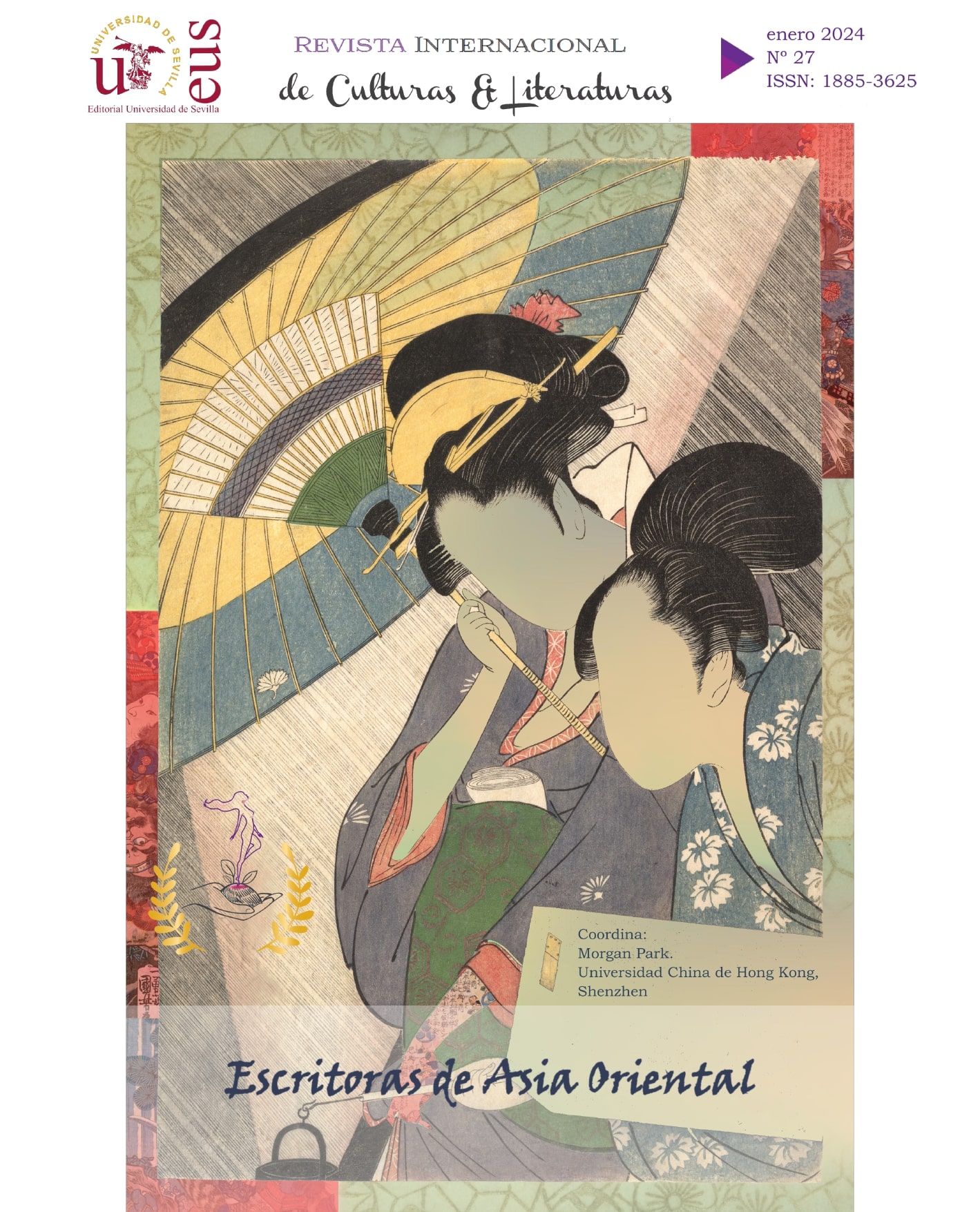Amor, trabajo, familia. Mujeres y relaciones de género en la obra literaria de Zhang Jie
DOI:
https://doi.org/10.12795/RICL2024.i27.03Palabras clave:
literatura china, Zhang Jie, literatura femenina, relaciones de géneroResumen
Zhang Jie (1937-2022) es una autora consagrada en la escena literaria china. Sus primeras publicaciones datan de finales de la década de 1970, coincidiendo con el inicio de la política de reforma y apertura china. El efecto del giro político del país se percibe también en el ámbito literario con el surgimiento de distintas temáticas, géneros y estilos que se alejaban del realismo socialista para reflexionar sobre el impacto del maoísmo en la población china, como la corriente denominada “literatura de cicatrices”, de autoría masculina. Sin embargo, el artículo propone una lectura feminista de esta etapa. A partir de tres de las obras de Zhang Jie traducidas al castellano, No olvidar el amor [1979] (1990), Galera [1982] (1995) y Esmeralda [1984] (2007), se analiza cómo la mirada crítica femenina de esta autora se plasma en los retratos literarios de sus protagonistas y en la descripción de las relaciones que mantienen con sus colegas, esposos, hijos y cuadros, denunciando el poder masculino que perpetúa la desigualdad de género, a pesar del discurso igualitario socialista del Partido Comunista Chino.
Descargas
Citas
“The Life and Literature of Zhang Jie” (14 de Abril de 2003), Beijing Scene, Volume 7, Issue 13, April 14 – 2000. Recuperado de http://www.beijingscene.com/cissue/feature.html [Fecha de consulta, 6 de junio de 2023]
BARLOW, Tani E. (1994). “Theorizing Woman: Funü, Guojia, Jiating (Chinese Women, Chinese State, Chinese Family)”. En Angela Zito y Tani Barlow (edas.), Body, Subject & Power in China (pp. 253-289). Chicago: University of Chicago Press, Chicago,
BARLOW, Tani E. (2004). The Question of Women in Chinese Feminism. Durham and London: Duke University Press,
CHEN, Xiaomei (1994). “Reading Mother's Tale-Reconstructing Women's Space in Amy Tan and Zhang Jie”. Chinese Literature: Essays, Articles, Reviews (CLEAR), Vol. 16, pp. 111-132.
CHONG, Woei Lien (1995) “The Position of Women in China: A Lecture by Woman Writer Zhang Jie”. China Information 10.1. pp. 51-58.
CHOW Esther, ZHANG Naihua y WANG Jiling (2004). “Promising and Contested Fields. Women´s Studies and Sociology of Women/Gender”. Contemporary China Gender & Society vol. 18, nº 2 (April), pp. 161-188.
HAGENAAR, Elly (1995) “Some Recent Literary Works by Zhang Jie: A Stronger Emphasis on Personal Perspective”. China Information 10.1, pp. 59-71.
KINKLEY, Jeffrey C. (1985). After Mao: Chinese Literature and Society, 1978–1981. Harvard: University Asia Center Publications Program.
LI, Xiaojiang (2006) “Ganancias y pérdidas de las mujeres en la construcción y la transición de la República Popular China: panorámica de la liberación y del crecimiento de las mujeres en China desde 1949”. En Amelia Sáiz López (eda.) Mujeres asiáticas: Cambios social y modernidad (pp.77-113). Documentos Cidob, serie Asia nº12. Barcelona: Fundació Cidob.
LIU, Kang (1993) “Politics, Critical Paradigms Reflections on Modern Chinese Literature Studies”. Modern China, Vol.1 9 No. 1, January1, pp. 13-40.
ROBERTS, Rosemary A. (1989) “Images of Women in the Fiction of Zhang Jie and Zhang Xinxin.”. The China Quarterly 120 (Dec), pp. 800-813.
SÁIZ LÓPEZ, Amelia (2000). Galera de la escritora Zhang Jie (Txalaparta, Tafalla, 1995) Revista Española del Pacífico, nº. 12, año X (II Semestre), pp. 237-239.
Sáiz López, Amelia (2001). Utopía y Género. Las mujeres chinas en el siglo XX. Barcelona: Edicions Bellaterra.
SÁIZ LÓPEZ, Amelia (2009). “Mujeres y género en la sociedad china contemporánea”. En Joan Julià-Muné (ed). Visions de la Xina: cultura multimil·lenària. Lleida: Institut d’Estudis Ilerdencs de la Diputació de Lleida, pp. 169-190.
WONG, Renita Yuk-Lin (1997). “Dispersing the “public and the private”. Gender and the State in the Birth Planning Policy of China”. Gender and Society, vol. 11, n14, (agosto), pp. 509-525.
XU, Xiaoqun. (1996). “The Discourse on Love, Marriage, and Sexuality in Post-Mao China”. Positions 4, No.2 (Fall), pp. 381-414.
YUE, Daiyun y WAKEMAN, Carolyn (1983). “Review: Women in Recent Chinese Fiction--A Review Article Author(s): Reviewed work(s): The Ark. by Zhang Jie The Dreams of Our Generation. by Zhang Xinxin”. The Journal of Asian Studies, Vol. 42, No., pp. 879-888.
ZHANG Jie (1990). “No olvidar el amor”. En Escritoras Chinas Barcelona: Editorial Icaria, pp. 75-94.
ZHANG Jie (1995). Galera. Traducción, Isabel Alonso. Tafalla (Navarrra): Txalaparta.
ZHANG Jie (2007). Esmeralda. Traducción: Lien-tan Pan e Indira Añorve Zapata. México: El colegio de México.

